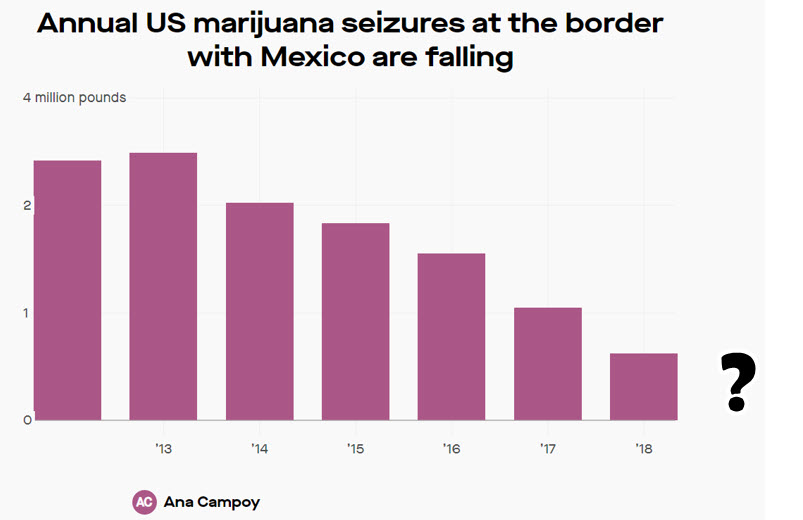
Are drug cartels better off legalizing cannabis in the US?
Are The Cartels Better By Decriminalizing And Legalizing Cannabis In The US?
On August 2, 2022, Senator John Cornyn (R-TX) questioned an expert panel on the negative effects of cannabis. For the most part, all of the answers from the medics in the room were accurate. They gave precise answers, which the senator didn’t particularly like.
One of these lines of inquiry was how tobacco causes cancer and a desire to find a similar response in relation to cannabis – both medical experts agreed that there is shockingly little evidence that smoking weed is in any way related to lung cancer.
Nevertheless, the senator wanted to emphasize this fact and the two medical representatives shot him. Why at minute 5:16 – he turned to “Mr. Cook” – who I assume is likely a representative of the DEA or some other law enforcement agency.
The Senator asked the following question;
Senator John Cornyn: “Mr. Cook, my experience and observation with the drug cartels is that they’re pretty much “commodity agnostic,” um – they’ll sell you anything you buy… um… why is that, even in the states that have decriminalized marijuana use or legalized that the cartels continue to be in this business, and I suppose as you said that comes with violence, er, protecting the territory’s market share… a lot of it has to do with street gangs operating as a distribution network for illegal Drugs run the United States…could you explain why, if it’s legal in those states, that the street gangs and the cartels are still in business?”
Yes, that was a lengthy question, but before I tell you why they’re still in business… let’s take a look at Mr. Cook’s answer;
Mr. Cook: “Uh, absolutely, and thanks for the question…the reality is exactly what you just said and that is we don’t put the cartels out of business…everything we do in states like California and especially Colorado…is able to move their production now…that is, bring “Grow Operations” here to the United States. Because under the guise of decriminalization and a reduced emphasis on marijuana, they can now run massive manufacturing operations. It saves them the cost of smuggling across the border…that’s one of the cartels’ biggest risks, you took that away from them, and now they’re moving into the state. They then compete with legitimate companies that we hope to promote and they compete with them at an unfair level because now they don’t pay taxes, they don’t comply with licensing laws, they don’t comply with labor laws, and now they’re doing the same product at a cheaper price price and where do you think consumers will go? Consumption has increased, so now they have an expanded market and lower costs. At the same time, the other element of what you just suggested is that down in Mexico all the resources that they saved by not growing marijuana have now been shifted to manufacturing methamphetamines, heroin and fentanyl, so we have them given them a double profit. They’re better off growing in the United States, they’re better off in Mexico with increased resources to manufacture and distribute other drugs.
And there you have it, a circular jerk of epic proportions. So let me go ahead and unpack and explain to these officials why they are wrong!
Why are there cartels in constitutional states?
First, the reason cartels are in legal cannabis states isn’t because they “grow the same way they grow in Mexico.” On the contrary, reports have shown that the price per kilo in Mexico has fallen massively due to product disparity.
You see, in places like California and Colorado, the industry has evolved and started producing cannabis with different characteristics. Some strains have more CBD than THC, others are grown to optimize THC production. The variety and potency of “US grown cannabis” surpassed Mexican Brick simply because it was better.
Consumers paid $10 a gram rather than $20 an ounce for seeds and stems. The gram of potent weed would last longer, get you high, and have a more pronounced medicinal effect.
The data supports the fact that American cannabis legalization hurt the cartels, as there was a dramatic drop in shipments from Mexico to the United States.
A large part of this is due to the cartels deciding to move their operations to the northern side of the border. Of course, the chart above shows us that the number of border seizures has decreased, and this is a good indication that the cartels are shipping less and less marijuana.
It is also true that cartels have started growing weed on public land and some legitimate businesses are DEFINITELY cartel funded. But the operations, which remain illegal, pose a serious risk to industry, public lands, and law enforcement.
In this case, Mr. Cook is not entirely wrong. However, he is wrong in saying that legalization has actually harmed the cartels. Because of this, they had to change tactics and migrate to the north, where they compete with the legal industry; However, unlike the legal industry, they are still wanted by law enforcement agencies.
Another thing Mr. Cook pointed out was that these organizations don’t pay taxes and whoever they can sell to. However, this has always been the case. This cannot be taken as a measure that legalization has failed.
On the contrary, the fact that the cartel had to adjust its strategy means that legalization is having an effect. Now the cartels are swapping their cannabis farms for poppies and producing harder drugs.
Yet the only reason the cartels still compete with the legitimate companies is not because they sell cheaper products (which they do) but because the government sets such high and expensive barriers to entry.
If cannabis had a lower entry cost, more people could grow and sell it, meaning you would be significantly devaluing the harvest. At some point, operating costs will exceed potential revenue and the cartel will eventually stop growing and selling weed illegally.
At that point, the smart ones would pivot into the legal industry, much like your favorite liquor brands did after the alcohol ban was lifted.
At least that’s the current theory based on what happened with alcohol prohibition. But to do that, you would have to really legalize cannabis federally, legalize home growing, and create a marketplace that could compete directly with the cartels — like Farmer’s Markets. I’ve written extensively here about creating a “cheaper” cannabis licensing scheme.
Under Prohibition, only the cartels win!
The senator’s question was intended to show how terrible the idea of legalization is. However, the United States has not seen “full legalization.” The fact that other states still have bans on their books means that the cannabis commodity has higher prices in those areas. Therefore, an incentive is created for people to break the law and sell across state lines, as well as for cartels who come to the city to open stores.
However, if you play the ban game, only the cartels stand a chance of winning. Because the more illegal something is, the higher the profit margins.
These folks talked about how cartels circumvent cannabis laws, but conveniently forgot that it was precisely drug prohibition in the 1970s that allowed the cartels to greatly increase their influence and income.
Prohibition will always favor the criminals, because if a particular shipment of drugs is seized, it just means profit margins will increase. When decriminalization occurs, they have an opportunity to pose as “the rest of us” to circumvent laws, and therefore the only way to take them out completely is to shut down all of their money-making activities entirely.
At the very least, it is within our power to legalize and regulate all drugs. To make the hard ones like heroin and fentanyl totally free for human consumption (though only if you’re addicted).
I would even argue that even if you are not a heroin addict, you should be able to get it legally.
Especially if you are a taxpayer. This is your solemn right as an individual who has sovereignty over his body and mind.
The drug cartels don’t play by the rules and hence the only true way to root out their influence is to shut down all their money-making activities completely. For kidnapping, extortion, etc. – these crimes actually require the same zeal as the drug warriors.
However, because cannabis and other drugs are so easily “busted” and “culprits” found, those in positions of power have little interest in legalizing cannabis or other drugs.
If Mr. Cook is concerned with the unfair nature of cartels and cannabis, I strongly recommend that we streamline the legalization process and work on an “anti-cartel department” that would focus all of its resources and energy on taking down actual criminals pursue.
This can only work if we stop chasing consumers.
Of course, we’re only talking about the points here, and in all likelihood – especially judging by the rest of the people in this hearing – we won’t see legalization happening quickly. Don’t get me wrong, it’s happening while we’re talking, just not fast enough.
CARTELS AND LEGALIZATION, READ MORE…

DEA CONFIRMS LEGALIZATION WILL HARM CARTELS, BUT WHY?

Post a comment: